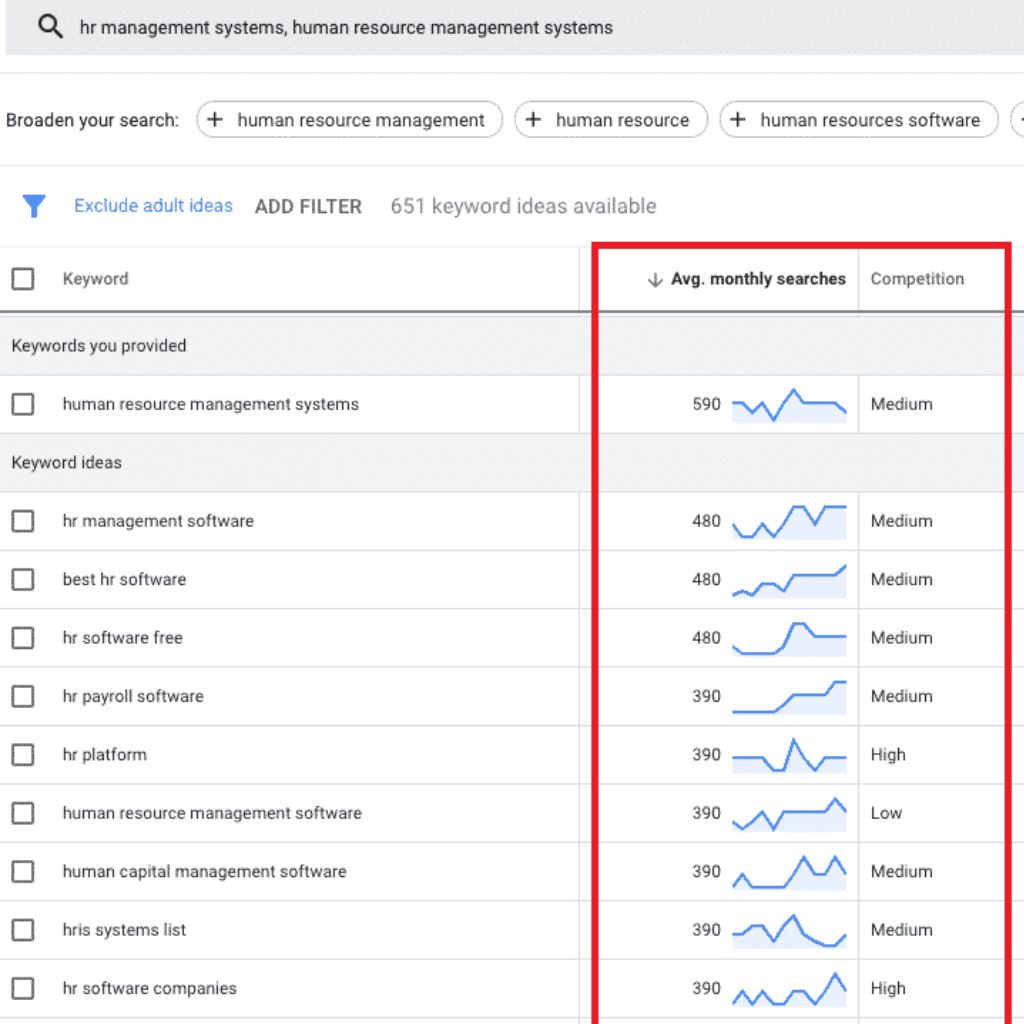Why Relevancy Should Be Your Primary Focus
When selecting keywords for your business, it’s crucial to focus on relevancy first and search volume second. The ultimate goal is not just to attract traffic but to convert that traffic into customers. Ideally, you would find highly relevant keywords with high search volumes, but in reality, this is rare. The key to success lies in understanding your audience and ensuring your keywords match their intent, leading to higher conversion rates.
Our Approach to Keyword Analysis
Step 1: Initial Client Consultation

Our keyword analysis begins with a deep dive into the client’s business and marketing goals. After an initial sales conversation, we ask clients to provide a list of keywords they believe potential customers might use to find their services or products. This initial list forms the foundation of our research.
Step 2: Expanding the Keyword List

Using our proprietary research tools and Google Search Console, we generate an expansive list of keywords. This list includes data on monthly search volumes and competition levels, which we then email to the client for review. This step ensures we have a comprehensive understanding of potential keywords.
Step 3: Educating the Client

We follow up with a phone call to explain the technical terms and the process of selecting the best keywords. This conversation helps clients understand the significance of each metric and how to make informed decisions.
Here are the four sub-steps we follow during keyword selection:
1. Keyword Relevancy
Understanding Search Intent

Keyword relevancy refers to how closely your keywords match the ads they trigger. It’s essential to think like your typical searcher. Use specific terms without being too generic, and consider different ways to phrase the same concept. For example, a lawyer can also be referred to as an attorney or counselor. By using intuition and asking the right questions, we ensure maximum relevancy, which leads to higher sales conversions.
2. Keyword Average Monthly Searches & Competition
Balancing Volume and Competition

This metric shows the average monthly search volume for a keyword, including variations, location, and search network data, in Google Ads process. The competition level indicates how many advertisers are bidding on the keyword, categorized as low, medium, or high. For businesses with lower budgets, it’s often strategic to avoid high-competition keywords to prevent rapid budget depletion.
3. Top of the Page Bid
Securing Prime Ad Positions
The top of the page bid refers to the highest bidders for a keyword, whose ads appear in the first three positions on Google. These top spots account for about 41% of all clicks on Google Ads. Being in these top positions significantly increases the chances of getting clicked, as users naturally read from the top of the page down.
4. Client’s Approval of Keyword List
Collaborative Keyword Selection
Client approval is vital for the final keyword list. While this might seem obvious, client input can provide valuable insights into selecting high-quality keywords. Clients know their business best, and their involvement ensures that the chosen keywords will perform well.
Avoiding the Pitfall of Copying Competitors
The Risks of Imitating Competitor Keywords
It’s common for clients to suggest copying competitors’ keywords. However, this strategy is flawed because competitors might not be using the best keywords. Additionally, each business is unique, and what works for one might not work for another.
Conducting thorough keyword analysis based on a true understanding of the client’s business is essential. While competitor websites can serve as useful references, they should not dictate your keyword strategy. Always ensure you know what you’re copying to avoid replicating potential mistakes.
By focusing on relevancy and understanding the nuances of keyword selection, you can create a more effective and conversion-driven keyword strategy. Remember, it’s not just about attracting traffic; it’s about turning that traffic into loyal customers.
Related Posts:
- The Critical Importance of Landing Page Construction in PPC Campaigns
- Mastering the Psychology of Google Ad Copy: Hooking Your Audience with Precision
- The Secret Sauce of Google Ads Campaigns: Mastering Ad Groups
- The Essential Role of Phone Call Tracking in Modern Google Ads Campaigns
- A Comprehensive Guide to Google Ads Campaign Monitoring and Optimization
- Effective Strategies for Adding New Keywords in Google Ads Campaigns
- Ultimate Optimization Guide to Bidding Adjustments in Google Ads
- The Power of Negative Keyword Filtering to Boost Your Google Ads Efficiency
- Advanced Reporting Techniques for Optimal Google Ads Performance









